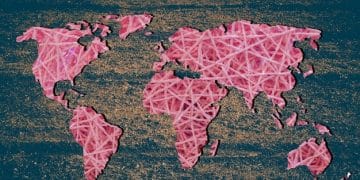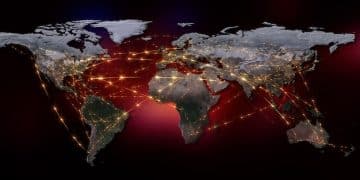US Immigration Policy Impact on 2025 International Relations

Advertisements
The evolving landscape of US immigration policies is poised to significantly reshape global diplomatic relations and economic partnerships in 2025, influencing alliances and creating new challenges across continents.
The intricate web of global politics is constantly shifting, and few factors hold as much potential to redraw international alignments as a nation’s internal policies. In this context, understanding the profound influence of US immigration policies on international relations in 2025 becomes paramount. As we approach mid-decade, the trajectory of US immigration decisions is set to send ripple effects far beyond its borders, shaping alliances, trade, and even regional stability.
The Geopolitical Landscape of Immigration in 2025
The interconnectedness of nations means that domestic policy rarely remains truly domestic. Immigration, a deeply
personal and equally public issue, stands as a prime example of this global interplay. By 2025, US immigration policies are not merely about border control or demographic shifts within the United States; they are critical levers influencing Washington’s relationships with key allies, economic partners, and even geopolitical rivals. The decisions made regarding asylum, skilled labor visas, and family reunification will reverberate across capitals worldwide.
One major aspect influencing the geopolitical landscape is the evolving stance on humanitarian migration. Nations facing internal strife or environmental crises look to the US for leadership and humanitarian aid, often tied to asylum processes. A restrictive US policy can strain these relationships, compelling other nations to bear a disproportionate burden or seek alternative alliances. This, in turn, can inadvertently enhance the influence of competing powers.
Economic Implications and Labor Mobility
Immigration policies have a direct impact on global economic dynamics. The US, with its vast economy, attracts talent and labor from virtually every corner of the world. In 2025, shifts in policies regarding H-1B visas, investor visas, and other categories capable of attracting skilled workers will dictate talent flows and innovation hubs. If the US restricts these inflows, other nations, particularly those with burgeoning economies and competitive tech sectors, stand to benefit.
Consider the potential for brain drain or gain. If the US becomes less attractive for highly skilled individuals, countries like Canada, the UK, Germany, and even emerging economies in Asia, are actively positioning themselves to welcome this talent. This competition for human capital adds another layer to international relations.
- Shifts in skilled worker visas can redirect talent pools.
- Changes in investment immigration influence foreign direct investment.
- Remittances from diaspora communities are a significant economic factor for many nations.
- Economic ties can be strengthened or weakened by labor mobility agreements.
Conversely, an open and agile immigration system could bolster US economic competitiveness, particularly in critical sectors like artificial intelligence, biotechnology, and renewable energy. It attracts diverse perspectives and entrepreneurial spirit, which are vital for sustained innovation. Balancing economic needs with perceived social and security concerns remains a delicate act.
Impact on Bilateral and Multilateral Alliances
US immigration policy, particularly concerning its southern border, profoundly affects its relationship with Latin American countries. Nations like Mexico, Guatemala, Honduras, and El Salvador are directly impacted by US asylum procedures, enforcement measures, and deportation policies. Cooperation on migration management, security, and economic development often hinges on the perceived fairness and efficacy of US approaches.
Beyond immediate neighbors, these policies can also test the resilience of traditional alliances. European allies, for instance, often express concern over human rights implications or the potential for increased migratory pressures on their own borders, as a result of shifts in US policy. Discussions within NATO or G7 summits can incorporate these debates, potentially creating points of friction or fostering new avenues for cooperation.
Diplomatic Engagement and Shared Responsibilities
The concept of shared responsibility in managing global migration flows is a recurring theme in international diplomacy. The US, as a global leader, is expected to contribute constructively to these discussions. When US policy is perceived as unilateral or excessively restrictive, it can undermine efforts to forge multinational solutions to complex humanitarian crises.
Take for example, the global refugee crisis. While the US has traditionally been a significant resettlement country, any substantial reduction in its intake or changes in its asylum processes could put immense pressure on front-line states in Europe, the Middle East, and Africa. This could lead to resentment, accusations of burden-shifting, and a general weakening of international cooperation frameworks aimed at protecting vulnerable populations.
- Policy alignment or divergence can affect diplomatic leverage.
- Shared border security concerns often drive bilateral talks.
- Humanitarian aid and development initiatives are frequently linked to migration patterns.
Furthermore, the language and rhetoric used by US officials regarding immigration can have significant diplomatic consequences. Statements perceived as xenophobic or discriminatory can alienate diaspora communities within the US and provoke strong reactions from their countries of origin, complicating diplomatic efforts on a range of issues.
The Role of Immigration in Soft Power and Global Perception
Soft power, defined as the ability to attract and co-opt rather than coerce, is a crucial component of international relations. The United States has historically wielded significant soft power through its image as a land of opportunity, a beacon of democracy, and a melting pot of cultures. US immigration policies directly impact this perception.
In 2025, if policies are seen globally as unwelcoming, overly restrictive, or discriminatory, they risk eroding this fundamental aspect of US influence. Students, entrepreneurs, researchers, and artists from around the world might choose other destinations for their careers and lives, diminishing the flow of talent and innovation that has long fueled US dynamism. This can be a subtle yet profound loss of influence.
International Norms and Human Rights
Immigration policies are not just practical matters; they also reflect a nation’s commitment to international human rights norms and conventions, such as the Refugee Convention. The global community closely observes how the US treats migrants, asylum seekers, and undocumented residents. Instances of perceived human rights violations or departures from international standards can draw sharp criticism and damage Washington’s standing.
For many emerging democracies, particularly those transitioning from authoritarian rule, the US serves as a model. A strong and consistent adherence to human rights in its immigration practices would reinforce this leadership role. Conversely, any perceived deviation could undermine efforts to promote human rights and democratic values abroad.
- US adherence to international refugee law impacts global standards.
- The treatment of migrants affects human rights advocacy efforts globally.
- Cultural exchange programs can be bolstered or diminished by immigration policies.
Moreover, the perception of fairness and justice in the US immigration system can influence the willingness of other nations to cooperate on issues ranging from counter-terrorism to climate change. Trust in US values and principles is often tied to how it treats the most vulnerable populations seeking refuge or opportunity within its borders.

Economic and Trade Repercussions
Beyond talent, immigration policies also bear directly on trade relationships. The movement of people often facilitates the movement of goods, services, and capital. For instance, diaspora communities frequently play a vital role in fostering trade links between their home countries and the US, acting as cultural and economic bridges.
In 2025, any significant disruption to these flows, especially concerning business visas or skilled labor necessary for joint ventures, could have unforeseen consequences for bilateral trade agreements and multinational corporate investments. Trade partners might look for more stable environments for their human capital needs.
Agricultural and Seasonal Labor Needs
Many sectors of the US economy, particularly agriculture, rely heavily on seasonal and temporary foreign labor. Policies governing these workers have direct implications not only for the US food supply chain but also for the economies of countries that send these laborers. Changes in guest worker programs can lead to significant economic shifts in source countries, potentially fostering instability or redirecting labor flows to other nations.
A stable and predictable framework for agricultural and seasonal workers is therefore crucial for maintaining strong economic ties with many Central and South American nations. Disruptions can cause economic hardship and, in turn, contribute to further irregular migration, creating a complex feedback loop that challenges diplomatic solutions.
- Restrictions on business travel impact cross-border commerce.
- Bilateral trade agreements may include provisions for labor mobility.
- Remittances from foreign workers are vital foreign exchange for many developing nations.
Furthermore, the debate around immigration often intertwines with discussions about economic competitiveness. Policies that facilitate the entry and integration of immigrants, especially those with entrepreneurial skills, can stimulate local economies and create new businesses, contributing positively to overall GDP and fostering economic dependencies that reinforce international relationships.
Security Implications and Border Cooperation
Immigration policies are inextricably linked with national security concerns, influencing intelligence sharing, counter-terrorism efforts, and cross-border criminal investigations. The US engages in extensive cooperation with neighboring countries and international partners on border management, information exchange, and combating transnational crime.
In 2025, the nature of this cooperation will continue to be shaped by US immigration strategies. For instance, heightened border enforcement without robust humanitarian considerations can inadvertently push migrants into more perilous routes, creating new challenges for law enforcement and humanitarian organizations on both sides of a border. This can strain operational partnerships.
Refugee Resettlement and Asylum Processes
The processing of asylum claims and the operation of refugee resettlement programs are not just internal administrative issues; they are fundamentally matters of international security and stability. When the US rapidly processes and provides pathways for vulnerable populations, it contributes to global stability by alleviating pressure on immediate host countries and reducing the potential for humanitarian crises to escalate into regional conflicts.
Conversely, bottlenecks, prolonged detention, or a perception of systemic unfairness in the asylum process can create discontent in transit countries and origin nations, complicating broader security dialogues. The efficiency and fairness of these processes are often viewed as indicators of US commitment to global norms and responsibilities.
- Intelligence sharing on migration routes is critical for security.
- Cooperation on human trafficking operations strengthens international law enforcement.
- Joint border patrols and technology sharing are common security measures.
The security aspect therefore necessitates a delicate balance between strict enforcement and compassionate humanitarian policies. Ignoring one in favor of the other often leads to unintended consequences that ultimately undermine both national security and international trust. Collaborative approaches, which involve sharing best practices and resources with international partners, are essential for effective border security that also upholds human dignity.
Regional Dynamics and Demographic Shifts
The demographic impacts of US immigration policies extend beyond its own borders. Population movements can profoundly affect the labor markets, social structures, and political landscapes of both sending and receiving countries. By 2025, any significant alteration in US immigration intake or enforcement could trigger notable demographic shifts in countries primarily supplying migrants to the US.
For example, a restrictive approach might lead to an oversupply of labor in certain sending countries, potentially depressing wages or increasing unemployment. Conversely, a more open policy could accelerate brain drain or labor drain in these same nations, posing challenges to their own development trajectories. These dynamics inevitably become topics of bilateral and multilateral discussions.
The Role of Diaspora Communities
Diaspora communities are often powerful non-state actors in international relations. They advocate for their home countries, contribute to economic development through remittances, and serve as cultural ambassadors. US immigration policies directly influence the size, vitality, and influence of these communities.
In 2025, policies that foster the integration and well-being of diaspora groups will likely strengthen their ties to both the US and their countries of origin, facilitating cultural exchange and economic cooperation. Policies perceived as hostile or discriminatory, on the other hand, could alienate these communities, potentially diminishing their positive influence on international relations.
- Demographic changes in sending nations impact bilateral aid discussions.
- Cultural exchange and soft diplomacy are often facilitated by diaspora groups.
- Regional migration pacts aim to manage population flows collaboratively.
Maintaining open dialogues with countries significantly impacted by these demographic shifts is essential for the US. Understanding their perspectives and concerns can help shape policies that are not only effective for the US but also contribute to regional stability and reduce potential diplomatic friction. This foresight helps to mitigate unintended consequences and foster more robust international partnerships.

| Key Aspect | Brief Description |
|---|---|
| 🌍 Geopolitical Leverage | US policies influence alliances by affecting humanitarian burdens & cooperation with source countries. |
| 💼 Economic Impact | Skilled labor, trade, and remittances directly tied to visa policies and migrant flows. |
| 🕊️ Soft Power & Norms | Perception of US global leadership and human rights commitment affected by immigration treatment. |
| 🤝 Security & Cooperation | Border management and intelligence sharing are co-dependent on reciprocal trust and policy alignment. |
Frequently Asked Questions
▼
US immigration policies, particularly those concerning border security and asylum, directly influence its diplomatic relations with Latin American countries. Restrictive measures or perceived human rights issues can strain cooperation, while collaborative approaches like joint migration management initiatives can strengthen partnerships. Economic impacts on sender nations, such as reduced remittances or labor market imbalances, also play a crucial role in these relationships.
▼
Skilled migration is a vital component. Policies on visas like H-1B, which attract high-tech talent, directly impact the US’s economic competitiveness and innovation leadership. If the US restricts these avenues, other nations may become more appealing to global talent, potentially influencing technology transfer, research partnerships, and overall economic alliances, as countries vie for the brightest minds.
▼
Absolutely. The rhetoric surrounding US immigration policy can significantly shape global perceptions of the country. If the language is seen as unwelcoming or discriminatory, it can erode the US’s soft power, making it less attractive to international students, tourists, and businesses. Conversely, a welcoming and inclusive narrative can enhance its appeal and strengthen its diplomatic influence worldwide.
▼
Humanitarian immigration policies, especially concerning refugees and asylum seekers, are critical. Allies, particularly in Europe, often observe US practices closely. A strong commitment to humanitarian intake and fair processes can foster trust and shared responsibility in addressing global crises. However, perceived failures or unilateral shifts can create friction and put disproportionate burdens on other nations, straining alliances.
▼
Economic consequences are substantial for trade partners. Policies affecting the movement of labor, particularly seasonal workers and business travelers, directly impact bilateral trade volumes and investments. Diaspora communities often facilitate trade, so policies that affect their engagement can have ripple effects. Any instability or unpredictability in immigration policies introduces risk for foreign businesses operating or looking to invest in the US.
Conclusion
The analysis of US immigration policies on international relations in 2025 reveals a landscape where domestic decisions have undeniable global ramifications. From shaping economic partnerships and influencing the flow of global talent to impacting humanitarian efforts and redefining geopolitical alliances, the nuanced approach to immigration is more critical than ever. As a global power, the United States’ posture on immigration will continue to be a powerful determinant of its standing, its influence, and the broader tapestry of international affairs, demanding thoughtful consideration and strategic foresight.





